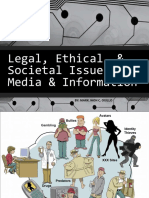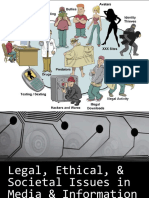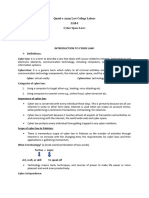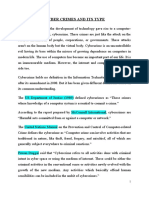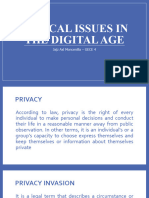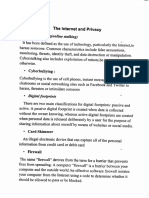0 ratings0% found this document useful (0 votes)
4 viewsRepublic Act No. 10175 Digital Piracy: 2 Types of Defamation
Republic Act No. 10175 Digital Piracy: 2 Types of Defamation
Uploaded by
francisjoycebelmonteThe document defines and explains various cybercrimes and legal issues related to online interactions and the internet, including hacking, phishing, illegal downloading, cyberbullying, identity theft, cyber defamation, child pornography, copyright infringement, and more.
Copyright:
© All Rights Reserved
Available Formats
Download as DOCX, PDF, TXT or read online from Scribd
Republic Act No. 10175 Digital Piracy: 2 Types of Defamation
Republic Act No. 10175 Digital Piracy: 2 Types of Defamation
Uploaded by
francisjoycebelmonte0 ratings0% found this document useful (0 votes)
4 views2 pagesThe document defines and explains various cybercrimes and legal issues related to online interactions and the internet, including hacking, phishing, illegal downloading, cyberbullying, identity theft, cyber defamation, child pornography, copyright infringement, and more.
Original Title
mil...
Copyright
© © All Rights Reserved
Available Formats
DOCX, PDF, TXT or read online from Scribd
Share this document
Did you find this document useful?
Is this content inappropriate?
The document defines and explains various cybercrimes and legal issues related to online interactions and the internet, including hacking, phishing, illegal downloading, cyberbullying, identity theft, cyber defamation, child pornography, copyright infringement, and more.
Copyright:
© All Rights Reserved
Available Formats
Download as DOCX, PDF, TXT or read online from Scribd
Download as docx, pdf, or txt
0 ratings0% found this document useful (0 votes)
4 views2 pagesRepublic Act No. 10175 Digital Piracy: 2 Types of Defamation
Republic Act No. 10175 Digital Piracy: 2 Types of Defamation
Uploaded by
francisjoycebelmonteThe document defines and explains various cybercrimes and legal issues related to online interactions and the internet, including hacking, phishing, illegal downloading, cyberbullying, identity theft, cyber defamation, child pornography, copyright infringement, and more.
Copyright:
© All Rights Reserved
Available Formats
Download as DOCX, PDF, TXT or read online from Scribd
Download as docx, pdf, or txt
You are on page 1of 2
REPUBLIC ACT NO.
10175 Digital Piracy is the practice of illegally copying
Cybercrime Prevention Act of 2012 and selling digital music, video, computer
software, etc.
Is a law in the Philippines approved on
September 12, 2012, which aims to address Identity Theft is the deliberate use of someone
legal issues concerning online interactions and else’s identity, usually as a method to gain a
the Internet. financial advantage or obtain credit and other
benefits in the other person’s name, and
Cyber means relating to involving computers or
perhaps to the other person’s disadvantage or
computer networks (such as Internet).
loss.
Cyberspace refers to the virtual computer
world, and more specifically, is an electronic
medium used to form a global computer Cyber Defamation is an unprivileged false
network to facilitate online communication statement of fact which tends to harm the
reputation of a person or company
Cybercrime refers to the criminal activities
carried out by means of computers or the 2 Types of Defamation
Internet
• Libel – Written
Cyber bullying the use of electronic
• Slander – Verbal
communication to bully a person, typically by
sending messages of an intimidating or Cyber sex also called computer sex, internet
threatening nature. sex, netsex, is a virtual sex encounter in which
two or more people send each other sexually
Hacking refers to the practice of modifying or
explicit contents or sexually explicit acts.
altering computer software and hardware to
accomplish a goal that is considered to be Child Pornography is a form of child sexual
outside of the creator’s original objective. Those exploitation.
individual who engage in computer hacking
activities are typically referred to as “hackers”. Cyber squatting is registering, trafficking in, or
using an Internet domain name with bad faith
Phishing is the attempt to obtain sensitive intent to profit from the goodwill of a
information such as usernames, passwords, and trademark belonging to someone else.
credit card details, often for malicious reasons,
by disguising as a trustworthy entity in an Copyright is a legal device that gives the creator
electronic communication o literary, artistic, musical, or other creative
work the sole right to publish and sell that work.
Illegal downloading refers to obtaining files that Violation of a copyright is called Infringement.
you do not have the right to use from the
Internet. Plagiarism is an act or instance of using or
closely imitating the language and thoughts of
another author without authorization; the
representation of that author’s work as one’s
work, as by not crediting the original author.
Fair use is a legal concept that allows the
reproduction of copyrighted material for certain
purposes without obtaining permission and
without paying a fee.
Computer addiction is the excessive use of
computers to the extent that it interferes with
daily life. This excessive use may for example
interface with work or sleep, result n problems
with social interaction, or affect mood,
relationships and thought processes.
Digital divide is an economic inequality
between groups in terms of access to, use of, or
knowledge of ICT.
Virtual self is the persona you create about
yourself virtually
Netiquette is the correct or acceptable way of
communicating on the Internet.
You might also like
- HSBCDocument2 pagesHSBCВлад АнгелNo ratings yet
- Legal, Ethical, and Societal Issues in Media and InformationDocument3 pagesLegal, Ethical, and Societal Issues in Media and InformationLissa Mae Macapobre80% (5)
- Co1 Mil LegalDocument36 pagesCo1 Mil LegalMary Rose VillaceranNo ratings yet
- Mil 2 PDFDocument1 pageMil 2 PDFJim Laurence LadiaoNo ratings yet
- Legal, Ethical, & Societal Issues inDocument47 pagesLegal, Ethical, & Societal Issues inChristine Mae LiwagNo ratings yet
- Legal, Ethical, and Societal Issues in Media and Information LiteracyDocument1 pageLegal, Ethical, and Societal Issues in Media and Information LiteracyAllen AllenNo ratings yet
- Instructional Module in Media12 Lesson 8Document2 pagesInstructional Module in Media12 Lesson 8Daneya Enrica JoseNo ratings yet
- 8 Legal, Ethical and Societal Issues in IctDocument30 pages8 Legal, Ethical and Societal Issues in IctNorhaynie SampornaNo ratings yet
- 03 - Legal, Ethical, and Societal Issues in Media and InformationDocument40 pages03 - Legal, Ethical, and Societal Issues in Media and InformationJooyeon ShinNo ratings yet
- 7 L e S I M I 170730072409Document64 pages7 L e S I M I 170730072409JonahLizaCasesNo ratings yet
- 7 1Document80 pages7 1vernaNo ratings yet
- Cf&di NotesDocument16 pagesCf&di Notesahalyarajeev.bt20No ratings yet
- Legal, Ethical, & Societal Issues in Media & Information: CyberDocument3 pagesLegal, Ethical, & Societal Issues in Media & Information: Cyberjoefrey BalumaNo ratings yet
- Legal Ethical and Sociaetal Issues PDFDocument67 pagesLegal Ethical and Sociaetal Issues PDFjonnefer masangyaNo ratings yet
- Egal Ethical and Societal Issue in Media and InformationDocument67 pagesEgal Ethical and Societal Issue in Media and InformationAxl Rama DoctoleroNo ratings yet
- Legal, Ethical, and Societal Issues in Media and InformationDocument50 pagesLegal, Ethical, and Societal Issues in Media and InformationIanztky AlbertNo ratings yet
- Title Legal, Ethical, & Societal IssuesDocument22 pagesTitle Legal, Ethical, & Societal Issuesangeli camilleNo ratings yet
- Lesson 7 Legal Ethical and Societal Issues in Media and InformationDocument72 pagesLesson 7 Legal Ethical and Societal Issues in Media and InformationKhate Uy-ocoNo ratings yet
- Legal, Ethical, & Societal Issues in Media & Information 1Document21 pagesLegal, Ethical, & Societal Issues in Media & Information 1Ke YmNo ratings yet
- Cyber Crimes and The Law: CybercrimeDocument6 pagesCyber Crimes and The Law: CybercrimeAman GautamNo ratings yet
- Inbound 3741383423091718019Document51 pagesInbound 3741383423091718019Myrlin Dura MaghanoyNo ratings yet
- Module 2-EcommerceDocument69 pagesModule 2-EcommerceHIEZEL BAYUGNo ratings yet
- ICT TerminologiesDocument22 pagesICT TerminologiesHazel CamoronganNo ratings yet
- Part1 IntroductionDocument29 pagesPart1 Introductionsingh246018No ratings yet
- Cyber CrimesDocument9 pagesCyber CrimesDr A. K. SubramaniNo ratings yet
- Law of TortDocument8 pagesLaw of TortAsha PrajapatiNo ratings yet
- Law Relating To Use of Computers in India Assignment - Cyber Law NualsDocument15 pagesLaw Relating To Use of Computers in India Assignment - Cyber Law Nualssherry j thomasNo ratings yet
- Cyber CrimeDocument20 pagesCyber CrimeSameer PariharNo ratings yet
- DefinitionsDocument5 pagesDefinitionsKAINAT KHANNo ratings yet
- Why Cyberlaw in IndiaDocument8 pagesWhy Cyberlaw in IndiaSaurabh KhannaNo ratings yet
- Cyber LawDocument8 pagesCyber LawPrayansh JainNo ratings yet
- Cyber Law Ca3Document5 pagesCyber Law Ca3sumitkumarraj53535No ratings yet
- Cyber - Security Unit - 1Document61 pagesCyber - Security Unit - 1regina100% (3)
- Cyber Crime in IndiaDocument8 pagesCyber Crime in IndiaAnooja Sajeev100% (1)
- Notes in CDI 4 Organized Crime InvestigationDocument3 pagesNotes in CDI 4 Organized Crime InvestigationQueen Vi BenedictoNo ratings yet
- Cyber Crime in BangladeshDocument9 pagesCyber Crime in Bangladeshapi-291831560No ratings yet
- Cyber Crimes and Its TypeDocument11 pagesCyber Crimes and Its TypeShubhamSudhirSrivastavaNo ratings yet
- Csf-Unit 1Document26 pagesCsf-Unit 1sujanaturkapalli4No ratings yet
- CBS Unit1.2Document50 pagesCBS Unit1.2voila.albertoNo ratings yet
- Cyber Law: Legal Environment of BusinessDocument24 pagesCyber Law: Legal Environment of BusinessImtiaz SkNo ratings yet
- Cyber Crime in IndiaDocument8 pagesCyber Crime in IndiaAnooja SajeevNo ratings yet
- Chapter 5Document37 pagesChapter 5Kriza MorenoNo ratings yet
- Module Iii Cyber CrimesDocument198 pagesModule Iii Cyber CrimesGuru CharanNo ratings yet
- Template 2Document29 pagesTemplate 2RhealynBalboaLopezNo ratings yet
- 4.legal and Ethical Issues Student Worksheet - For EntrepreneursDocument2 pages4.legal and Ethical Issues Student Worksheet - For EntrepreneursNiti DesaiNo ratings yet
- Cyber Security Unit 1 NotesDocument43 pagesCyber Security Unit 1 Noteschampionroyal361No ratings yet
- Cyber Frauds and CrimesDocument21 pagesCyber Frauds and Crimesjhonny mercadoNo ratings yet
- CybercrimesDocument30 pagesCybercrimessradhavidhyaNo ratings yet
- Cyber Security-Module2 NotesDocument27 pagesCyber Security-Module2 NotestwitterkatoolkitNo ratings yet
- Cybercrime LessonDocument27 pagesCybercrime LessonXivaughn SebastianNo ratings yet
- CS Unit-1Document25 pagesCS Unit-1kothurrabiyaeee.2446No ratings yet
- Common Issues and Crimes On The Internet: Learning CompetenciesDocument18 pagesCommon Issues and Crimes On The Internet: Learning CompetenciesPenelope RileyNo ratings yet
- Cybercrime ReportDocument21 pagesCybercrime ReportJESAMARIE TUBASISNo ratings yet
- Adobe Scan 29-Sep-2022Document8 pagesAdobe Scan 29-Sep-202235 Alex SequeiraNo ratings yet
- Internet Crime and PunishmentDocument54 pagesInternet Crime and Punishmentapiconpikk67% (3)
- Week 1 EmptechDocument37 pagesWeek 1 EmptechMaureen AnonuevoNo ratings yet
- Cyber CrimeDocument35 pagesCyber CrimeMohsin KawoosaNo ratings yet
- UNIT-I: Introduction To CybercrimeDocument30 pagesUNIT-I: Introduction To Cybercrimedinesh_panchariaNo ratings yet
- Chapter 3Document24 pagesChapter 3kgebrie23No ratings yet
- Welcome To Oyo Rooms: Founder and CEO:-Ritesh AgarwalDocument10 pagesWelcome To Oyo Rooms: Founder and CEO:-Ritesh AgarwalNitin MishraNo ratings yet
- Celce Lesson 1Document9 pagesCelce Lesson 1narcarosa22No ratings yet
- 505377-UEN TM D670I 2p2 PDFDocument1,536 pages505377-UEN TM D670I 2p2 PDFVladimir TomicNo ratings yet
- Exercises Matura - AllunitsDocument30 pagesExercises Matura - AllunitsRenata FiderkiewiczNo ratings yet
- OppDocument9 pagesOppHaripriya SridharanNo ratings yet
- Mariam Fernandez Gines Resume 5Document2 pagesMariam Fernandez Gines Resume 5api-748586116No ratings yet
- Aiface - Mars: Linux-Based Access Control and Time & Attendance Terminal With Visible Light Facial RecognitionDocument2 pagesAiface - Mars: Linux-Based Access Control and Time & Attendance Terminal With Visible Light Facial RecognitionSaptarshi GanguliNo ratings yet
- Rome Ciampino Airport - Historical Approach Charts - Military Airfield DirectoryDocument6 pagesRome Ciampino Airport - Historical Approach Charts - Military Airfield Directory2335rodrigocastanedoNo ratings yet
- Lecture Notes 1 - Finance - Principles of Finance Lecture Notes 1 - Finance - Principles of FinanceDocument7 pagesLecture Notes 1 - Finance - Principles of Finance Lecture Notes 1 - Finance - Principles of FinanceKim Cristian MaañoNo ratings yet
- SHHH It's A Secret (46-54)Document9 pagesSHHH It's A Secret (46-54)Abimael Resendis Morales100% (1)
- Cathodic ProtectionDocument19 pagesCathodic ProtectionAnthony MartinNo ratings yet
- Ra-3 Fg-L%Y'I Qyfl-, Am R WM R-Fa-Flf%?Document7 pagesRa-3 Fg-L%Y'I Qyfl-, Am R WM R-Fa-Flf%?sbpatil8808No ratings yet
- Caleb Dylan 6/18/18: Wright 949 N. Broad St. Grove City PA 16127 724 458 7484 724 974 8143Document2 pagesCaleb Dylan 6/18/18: Wright 949 N. Broad St. Grove City PA 16127 724 458 7484 724 974 8143CasualGamer13No ratings yet
- Iranshahi 2010Document15 pagesIranshahi 2010BAKRNo ratings yet
- Magdusa vs. AlbaranDocument3 pagesMagdusa vs. AlbaranAaron CariñoNo ratings yet
- Resume AnalyserDocument57 pagesResume AnalyserleoodassNo ratings yet
- Presentation On SBU Analysis of Bashundhara GroupDocument16 pagesPresentation On SBU Analysis of Bashundhara Groupmanagement 149100% (3)
- ConnercasememoDocument12 pagesConnercasememoapi-339018690No ratings yet
- Sponsorship ProposalDocument26 pagesSponsorship ProposalFaisal Nawaz50% (2)
- March 2024 Monthly CA Magazine 027dda53d14c1Document44 pagesMarch 2024 Monthly CA Magazine 027dda53d14c1mailbijaytiwariNo ratings yet
- Fabre, Jr. vs. Court of AppealsDocument11 pagesFabre, Jr. vs. Court of AppealsLance Christian ZoletaNo ratings yet
- MLK Renovation Design Ideas, Team 1: Mecanoo + Martinez and JohnsonDocument29 pagesMLK Renovation Design Ideas, Team 1: Mecanoo + Martinez and Johnsondclibrary_social100% (1)
- Construction Industry Inspection Checklist (Long Version)Document6 pagesConstruction Industry Inspection Checklist (Long Version)Usman ShahidNo ratings yet
- Unable To Issue SVM Commands in Single User ModeDocument2 pagesUnable To Issue SVM Commands in Single User ModecresmakNo ratings yet
- Instruction manual of Hammer mill (英文)Document5 pagesInstruction manual of Hammer mill (英文)Nian SoonNo ratings yet
- Tentative Training Schedule For The Month of September - 2018 To The Employees of Apgenco, Aptransco, Apspdcl Apepdcl at Apgenco Training InstituteDocument3 pagesTentative Training Schedule For The Month of September - 2018 To The Employees of Apgenco, Aptransco, Apspdcl Apepdcl at Apgenco Training InstituteGanesh DasaraNo ratings yet
- RAJ Seminar PaperDocument16 pagesRAJ Seminar PaperMohammed RaihanNo ratings yet
- DRD700 PraesentationDocument41 pagesDRD700 PraesentationRalf RiedelNo ratings yet
- Programmable Logic Controller (PLC) : Abhishek SoniDocument36 pagesProgrammable Logic Controller (PLC) : Abhishek SoniAbhishek SoniNo ratings yet









